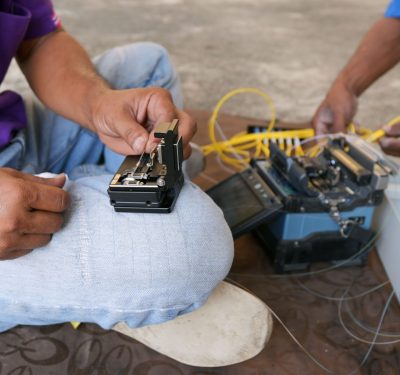No products in the cart.
Fiber Equipment Breakdowns in the Field: Essential Strategies
Home Fiber Equipment Breakdowns in the Field: Essential Strategies
- Home
- Resource Hub
- Millennium Blog
- Fiber Equipment Breakdowns in the Field: Essential Strategies

Fiber equipment breakdowns in the field: essential strategies
When your construction business’s growth relies on getting the job done right and on time, fiber equipment breakdowns in the field threaten your company’s reputation. Delays can disrupt project timelines, add to costs, and increase the risk of losing repeat business, making it crucial for contractors to have efficient response strategies in place. Here are key strategies contractors should implement for an effective field response to fiber equipment failures to avoid missing construction deadlines.
Proactive Maintenance & Inspection

A proactive maintenance strategy is your first line of defense against fiber equipment breakdowns. Scheduling routine inspections and maintenance checks can help you identify potential issues before they cause major setbacks to your fiber construction. Follow this checklist to reduce the likelihood of unexpected failures.
- Schedule regular inspections
- Keep a maintenance log
- Train crew to recognize signs of wear and tear
- Educate crew on proper diagnostic tools & preventative maintenance
Emergency Response Planning
Establishing communication procedures is also important so crews provide project managers with timely updates regarding breakdowns, troubleshooting, and repair status. This plan should clearly outline roles and responsibilities so everyone knows how to respond when equipment fails. Establishing communication procedures is also important so crews provide project managers with timely updates regarding breakdowns, troubleshooting, and repair status updates. With open lines of communication, project managers can make critical decisions on whether replacement equipment is needed. Regularly training staff on this emergency response plan and conducting drills can prepare crews to respond quickly and efficiently.
Job-Site Troubleshooting & Repair
Supplying your crew with the skills and tools for troubleshooting and repairing fiber equipment in the field is vital. Comprehensive training on common fiber equipment malfunctions empowers your crew to diagnose and fix equipment issues quickly. Invest in diagnostic tools that give your team what they need to handle breakdowns on the spot.
Leveraging Technology & Databases
Compile procedural guides, technical manuals, and resources for your field technicians to reference when diagnosing, troubleshooting, and repairing fiber equipment. Consider developing an internal knowledge base on your website to house all these resources, allowing field crews to access them on their mobile devices during fiber construction.
Building a Spare Parts Inventory

Another way to manage your fleet is to maintain an inventory of spare parts needed for common repairs. This well-organized stockpile should be readily available when needed. For example, it’s common to keep extra air filters, drive belts, o-rings, seals, and gaskets on hand to make repairs. An inventory management system helps you track and manage spare parts effectively.
Partner with Reliable Fiber Equipment Suppliers
Establishing a strong relationship with a reliable equipment supplier can significantly reduce response times during breakdowns. When fiber equipment breaks and your crew can’t fix the issue, having a trusted partner you can call for rapid support and equipment replacement makes all the difference. Millennium Equipment has your back during fiber equipment breakdowns with ready-to-ship fiber equipment. We source from top fiber equipment suppliers like GMP, EXFO, AFL, and more to keep your fiber construction on schedule.
- Fiber Blowers
- Fusion Splicers
- Testing Equipment
- Lashers
- Fiber Pullers
- Trailers
- Accessories
By incorporating these strategies, fiber construction contractors can streamline their response to equipment breakdowns, minimizing downtime and meeting project deadlines.
Reach out to one of our experts for more information.



